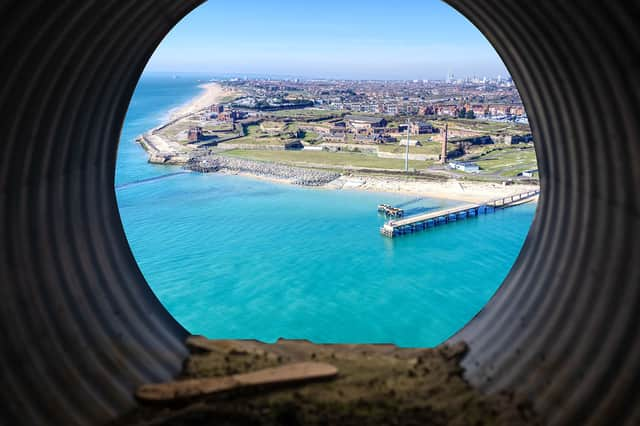Southern Water Langstone Harbour sewage spills - 181 hours across 8 days in nature conservation area


A “shocking” amount of sewage has been discharged into a UK nature conservation area - a site of special scientific interest. Southern Water has discharged sewage for 181 hours across eight days into Langstone Harbour, in Portsmouth, from an outflow pipe from Budds Farm sewage treatment works, according to its own data.
The releases began on 24 October and the total number of hours is the latest number as of today Wednesday (1 November), however with Storm Ciaran bringing heavy rain it is likely this number will increase. During periods of heavy rainfall sewer networks can become overwhelmed resulting in sewage being discharged from combined sewer overflows (CSOs) instead of being treated. Water companies are issued with permits that allow them to discharge sewage if their networks are overwhelmed by rainwater in what should be exceptional circumstances.
Advertisement
Hide AdAdvertisement
Hide AdProfessor Alex Ford posted on the social media platform X, alerting users to the sewage discharges into Langstone Harbour. He said on Tuesday (31 October): “Budds Farm sewage treatment plant has been discharging the sewage waste of 400,000+ people for 160 hours continuous (~7 days & counting) into Langstone Harbour: a Site of Special Scientific Interest (SSSI), Special Area of Conservation (SAC) & Internat. RAMSAR site for rare birds”.
Users responded to his post in disgust and anger. Kenneth Wasmun said it is “foul and disgraceful” while Mike Owens said it is “shocking”. John Wilson posted on X: “Disgraceful but I’m not surprised in the slightest. I have seen discharges into SACs for thousands of hours in a year. I blame the regulators almost as much as the water cos.”
It comes as swathes of beaches and popular spots across the UK have been blighted with sewage over recent days as heavy rain sweeps across the nation. The Met Office said Storm Ciaran could be “quite nasty” bringing gusts of wind of 80mph and disrupting travel.
Environment group Surfers Against Sewage (SAS) have warned the public not to swim at 131 beaches across the UK due to waste being discharged from a sewer overflow within the past 48 hours. SAS told NationalWorld there have been 28 sewage pollution alerts at Langstone Harbour since 25 October. The group added the nature conservation area had a total of 278 spills in 2021, 183 in 2022 and this year, with two months two go, Langstone Harbour has already had 190 sewage pollution alerts.
Advertisement
Hide AdAdvertisement
Hide AdProfessor Ford told NationalWorld: “In the past few days, there have been hundreds of hours of raw sewage discharges across the country. Water companies argue that it is very diluted by rainwater, but storm discharges which are mainly rainwater are still very high in pathogens, including E.coli, and it doesn’t take high concentrations of some chemicals like pharmaceuticals to harm wildlife.
“These prolonged and heavy rainfall events are exposing the fragility of our sewage infrastructure and the fact that water companies and governments for decades have taken our eyes off the ball with regard to climate change. We need to start some serious conversations over our sustainable use of water for humans and ecosystem health.”
A study in June found high levels of E-coli in a water sample taken from near an outflow pipe from Budds Farm sewage works. It showed a reading of 380,000 colony forming units per 100ml of E coli, which is 760 times the safe levels set out under the European bathing water directive.
A Southern Water spokesperson said: “There are many contributing factors towards water quality, and we work closely with a range of partners to protect and enhance our environment. The UK’s network of storm overflows prevent flooding of homes and schools when surface water levels increase in the sewer network during wet weather. However we recognise that this system is no longer acceptable to our customers and communities, so we are acting to reduce the flow and increase our capacity.
Advertisement
Hide AdAdvertisement
Hide Ad“As part of a £3bn investment in our network between 2020 and 2025, we are exploring innovative engineering and nature-based solutions to either slow or keep surface water out of sewers. We have ambitious targets to significantly reduce storm overflows by 2030 across our region, and are currently going further than Government plans have set out.”
Comment Guidelines
National World encourages reader discussion on our stories. User feedback, insights and back-and-forth exchanges add a rich layer of context to reporting. Please review our Community Guidelines before commenting.
